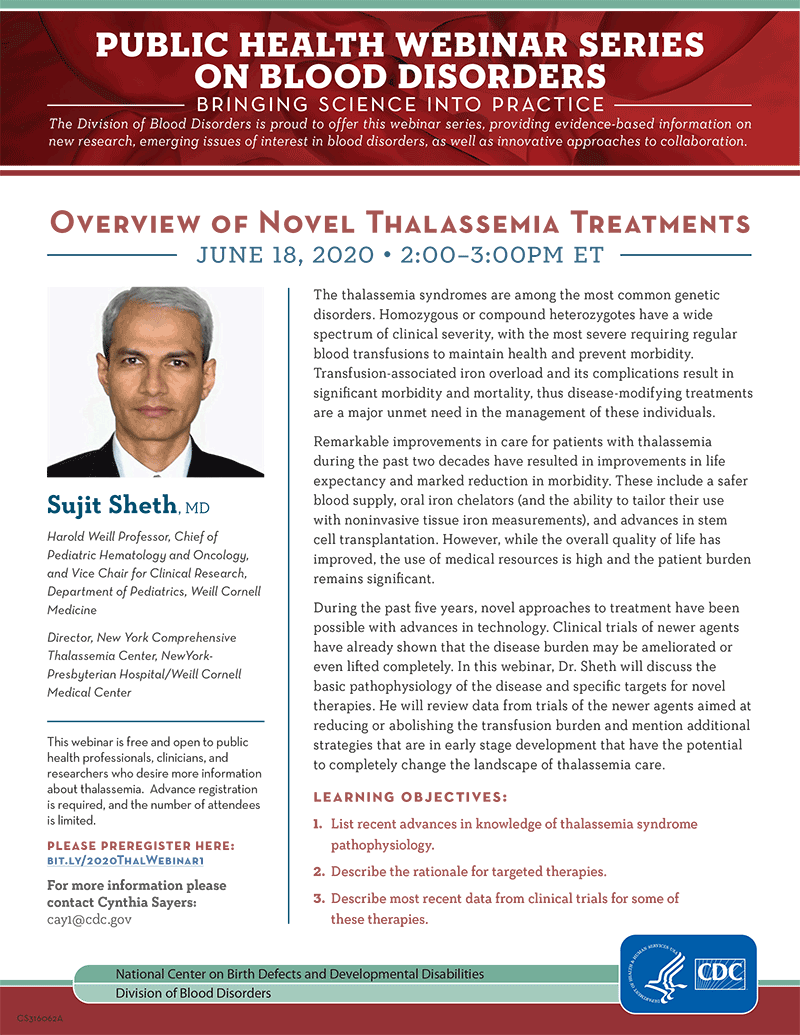

Public Health Webinar Series on Blood Disorders
Bringing Science into Practice
The Division of Blood Disorders is proud to offer this webinar series, providing evidence-based information on new research, emerging issues of interest in blood disorders, as well as innovative approaches to collaboration.
Overview of Novel Thalassemia Treatments
June 18, 2020 • 2:00–3:00PM ET
Sujit Sheth, MD
Harold Weill Professor, Chief of Pediatric Hematology and Oncology,
and Vice Chair for Clinical Research,
and Vice Chair for Clinical Research,
Department of Pediatrics, Weill Cornell Medicine
Director, New York Comprehensive Thalassemia Center,
New York-Presbyterian Hospital/Weill Cornell Medical Center
New York-Presbyterian Hospital/Weill Cornell Medical Center
The thalassemia syndromes are among the most common genetic disorders. Homozygous or compound heterozygotes have a wide spectrum of clinical severity, with the most severe requiring regular blood transfusions to maintain health and prevent morbidity. Transfusion-associated iron overload and its complications result in significant morbidity and mortality, thus disease-modifying treatments are a major unmet need in the management of these individuals.
Remarkable improvements in care for patients with thalassemia during the past two decades have resulted in improvements in life expectancy and marked reduction in morbidity. These include a safer blood supply, oral iron chelators (and the ability to tailor their use with noninvasive tissue iron measurements), and advances in stem cell transplantation. However, while the overall quality of life has improved, the use of medical resources is high and the patient burden remains significant.
During the past five years, novel approaches to treatment have been possible with advances in technology. Clinical trials of newer agents have already shown that the disease burden may be ameliorated or even lifted completely. In this webinar, Dr. Sheth will discuss the basic pathophysiology of the disease and specific targets for novel therapies. He will review data from trials of the newer agents aimed at reducing or abolishing the transfusion burden and mention additional strategies that are in early stage development that have the potential to completely change the landscape of thalassemia care.
Learning Objectives:
- List recent advances in knowledge of thalassemia syndrome pathophysiology.
- Describe the rationale for targeted therapies.
- Describe most recent data from clinical trials for some of these therapies.
This webinar is free and open to public health professionals, clinicians, and researchers who desire more information about thalassemia. Advance registration is required, and the number of attendees is limited.
For more information please contact Cynthia Sayers: cay1@cdc.gov
U.S. Department of Health and Human Services, Centers for Disease Control and Prevention, National Center on Birth Defects and Developmental Disabilities, Division of Blood Disorders






















.png)












No hay comentarios:
Publicar un comentario